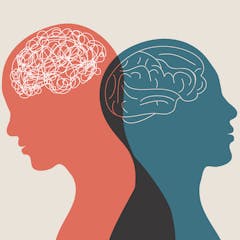
Articles sur Cognitive neuroscience
Affichage de 1 à 20 de 30 articles

People with aphantasia can’t imagine seeing things in their mind. People with ‘deep aphantasia’ may have no inner voice, either, and different real-world visual experiences.

Combining psychotherapy with medication can lead to more immediate and enduring results by boosting the brain’s neuroplasticity.

Glioblastoma is the most aggressive type of brain cancer, causing significant decline in cognitive function. New research suggests a common anti-seizure drug could help control tumor growth.

The European Union’s 10-year Human Brain Project is coming to a close. Whether this controversial 1 billion-euro project achieved its aims is unclear, but its online forum did foster collaboration.

Vaccine hesitancy is often met with one of two responses: Ridicule, or factual information. Both assume a failure of reason, but human behaviour is more complex than reason, so both responses fail.

New research shows the choices we make, and our perceptions of the world, are biased by our initial impressions.

If a friend seems to be immune to your spooky, ghost story this Halloween, ask them if they can see the story unfold in their mind’s eye.

Computational modeling can predict language therapy response in bilingual people with aphasia. In the future, this could help clinicians identify the best language for treatment.

In popular films and TV shows, poetry is typically used to express human feelings. This popular wisdom chimes with findings in cognitive neuroscience about how language works.

Consciousness is sometimes referred to as ‘the ghost’ in the machinery of our brain. Is it time we gave up the ghost to focus on the machine?

Cognitive neuroscientists use brain imaging and behavioral economic games to investigate people’s sense of fairness. They find it’s common to take care of yourself before looking out for others.

Research shows napping helps young children learn, as well as enhancing their emotional well-being.

The internet is awash with videos that claim to use ‘binaural beats’ to improve your focus or relieve stress. But while they can influence your brain, the touted mood-enhancing effects may not be.

Cognitive neuroscience finds that regular consumption of pornography affects the centres of the brain responsible for will power, impulse control and morality.

Do you ever find you suddenly need to turn off the radio so you can concentrate on what you’re doing? It’s because you only have a finite amount of attention, for particular types of tasks at least.

The ‘contexual-binding theory’ suggests memories are easier to retrieve when your brain is in a similar context to when the memory was first formed. Food for thought if you’re cramming for an exam.

Despite its huge complexity, your brain directs its neural traffic in relatively straightforward ways when approaching cognitively demanding tasks such as puzzles.

Brain functions integrate and compress multiple components of an experience, including sight and smell – which simply can’t be handled in the way computers sense, process and store data.

Ultra-clear maps of individual toes were found in the brains of two foot painters – these are not found in typically developed humans.

Have you ever walked into a room and realised you can’t remember what you were looking for? We tend to do this more when we are thinking of a few things at once or doing two things at the same time.
